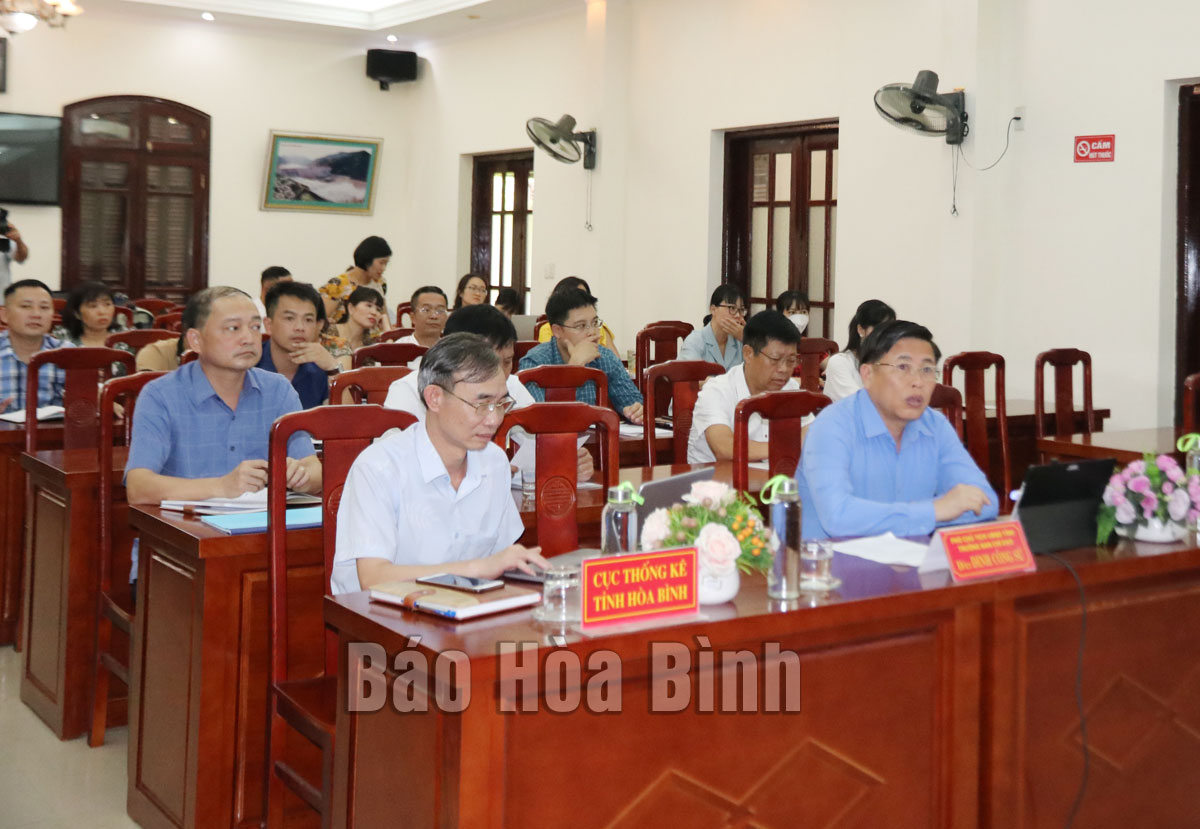
(HBO) – The steering committees of central economic census and central administrative facility survey on June 29 held a nationwide conference to announce the official findings for 2021. Truong Hai Long, Deputy Minister of Home Affairs chaired the event. Attending from Hoa Binh was a delegation headed by Dinh Cong Su, Vice Chairman of the provincial People’s Committee and head of the steering committee for the provincial 2021 economic census.

Dinh Cong Su, Vice Chairman of the provincial
People’s Committee, and other local delegates remotely attend the conference.
The 2021 economic census has a large scale surveying
enterprises; individual production units; non-business units and associations;
and religious establishments. With 2020 chosen as the year of data, between
March and December 2021, the economic census was deployed from central to local
levels through the economic census steering committees at all levels, and under
the Ministry of Defense and the Ministry of Public Security. To date, the
processing and summarising of official results have been completed on schedule.
As a result, the total number of surveyed units in the
economic census exceeded 6 million, an increase of 7.5% compared to 2016. The
number of employees in these units was 27.5 million, up 4.3% from 2016.
Speaking at the function, Truong Hai Long, Deputy Minister
of Home Affairs, highlighted the importance of the census in reviewing the
economic situation and proposing solutions for the socio-economic development
of the nation and each locality.
He said a number of outstanding achievements were recorded.
Many businesses were sustained and grew despite the pandemic; while the economic
structure continued to shift positively and in the right direction. The capital
structure among different types of enterprises also changed in a positive
direction, with non-state and FDI enterprises obtaining increasing proportions.
The proportion of heads of units with university or post-graduate degrees went
up significantly, reflecting the qualitative improvement of the core
workforce./.
Hoa Binh province is undergoing a dynamic transformation amid Vietnam’s national digital transition. Building on Poliburo’s Resolution No. 57-NQ/TW on breakthroughs in science, technology, innovation, and national digital transformation, the province has rolled out a wide range of practical action plans. A standout initiative is the "Digital Literacy for All” movement, an effort to ensure that no one is left behind in the digital era.
Hoa Binh province is undergoing a dynamic transformation in the wake of the national digital transformation movement. Building on Resolution No. 57-NQ/TW of the Politburo on breakthroughs in science, technology, innovation, and national digital transformation, the province has implemented a wide range of practical action plans. A standout initiative is the "Digital Literacy for All” movement ambitious effort to ensure that no one is left behind in the digital age.
With a spirit of unity and proactive problem-solving, the Party Committee, the government and the people of Dong Lai Commune (Tan Lac District) have made great strides in implementing the resolutions of the 24th Party Congress of the commune for the 2020 - 2025 term. Focusing on leadership and practical actions, the commune has brought the Party’s resolutions into daily life, creating strong impacts and pushing the local development forward.
Amid the nationwide push for digital transformation, young people in Hoa Binh Province are stepping up as dynamic pioneers, applying technology to enhance Youth Union operations and expand the reach of youth-led initiatives. Through creativity and adaptability, Youth Union organizations at all levels have introduced a series of practical solutions, contributing to modern governance and community development.
In recent years, An Nghia commune, located in Lac Son district, has stepped up administrative reform, focusing on improving the quality and efficiency of its single-window service unit for receiving and processing administrative procedures. These improvements have helped create favourable conditions for local residents and organisations to handle administrative procedures, contributing to the commune’s broader socio-economic development.
The Prime Minister-approved master plan to develop the multi-use value of forests ecosystems through 2030, with a vision to 2050, aims to improve the management and sustainable use of forest resources, create jobs, increase incomes, and improve the living standards of ethnic minorities, people in mountainous and remote areas, forest workers and those living near forests.



